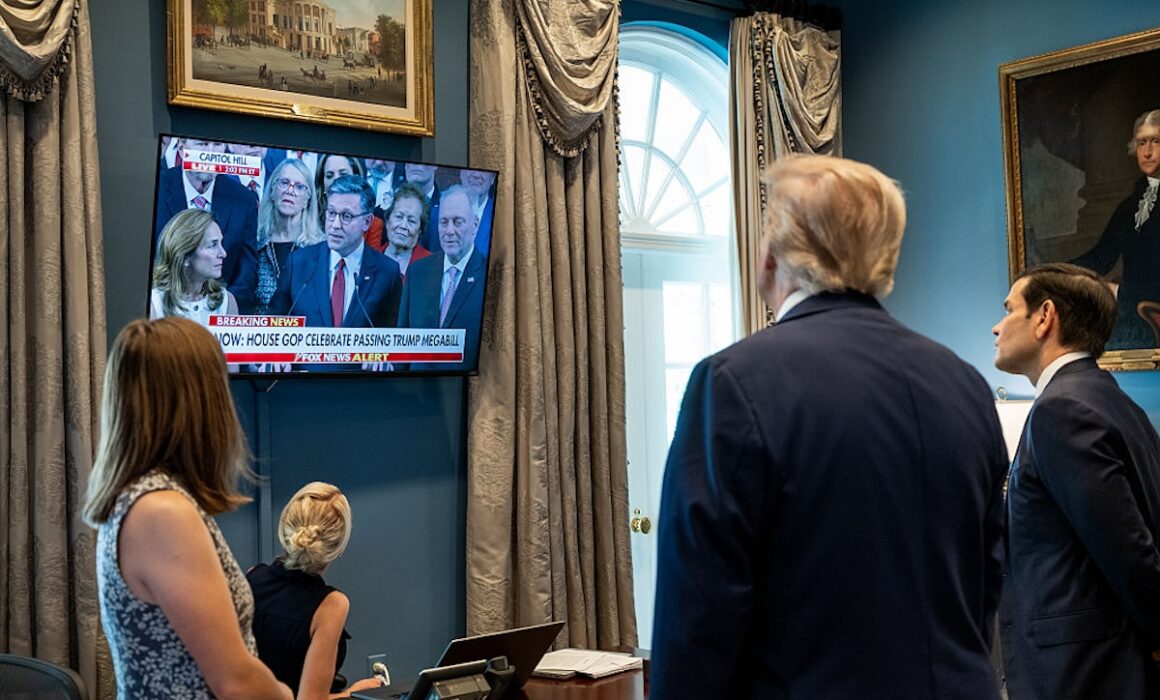One Big Brutal Budget Bill
July 11, 2025
How children will bear the brunt of cuts to the safety net
The Roosevelt Rundown features our top stories of the week.

President Donald Trump and Secretary of State Marco Rubio watch as Speaker of the House Mike Johnson (R-LA) announces the passing of the budget reconciliation bill on July 3, 2025. (Joyce Boghosian/The White House via Getty Images)
The Reverse Robin Hood Bill Takes Food and Medicine from Children and Gives Money to the Wealthy
Last week, congressional Republicans passed and Donald Trump signed an omnibus budget reconciliation package called the One Big Beautiful Bill Act. Roosevelters shared initial reactions to the bill in the days after it passed, and this week Roosevelt Program Manager Lena Bilik spotlighted the people who stand to lose the most under this economic agenda: children of low-income families.
“Congress just took medical care and food away from children to give massive tax breaks to some of the richest people in the world,” Bilik writes in a new blog post.
New work requirements for Medicaid—better understood as new paperwork requirements, as the vast majority of Medicaid recipients already meet the requirements—are expected to endanger health-care coverage for 1 in 5 children.
The bill also slashes funding for the Supplemental Nutrition Assistance Program (SNAP), limiting access to food and to other programs such as free school lunches that are determined based on SNAP eligibility. Families with children constitute 62 percent of SNAP recipients.
“We must loudly call the Republican budget bill what it is: anti-children and anti-family,” Bilik writes. “If lawmakers want to be ‘pro-family,’ they should start by acknowledging that our government should be in the business of investing in children.”
Read the post: “US Policies Already Fail Our Children. The GOP’s Budget Bill Will Make Things Worse.”
Watch this space in the months to come for more on the fallout from this bill: the disastrous consequences of cuts to the green energy investments from the Inflation Reduction Act and the revenue implications of paralyzingly insufficient taxes on high earners and corporations.
What We’re Talking About
What We’re Reading
- On industrial policy: Roosevelt’s Todd N. Tucker sat down with WBUR’s On Point to discuss the US Steel/Nippon Steel merger, the “golden share” aspect of the deal, and what the right degree of government intervention would be to ensure that private companies don’t jeopardize the public interest.
- On worker power: Nurses are suing employers over the use of third-party staffing apps that treat professional nurses like gig workers.
- Read more: “Uber for Nursing: How an AI-Powered Gig Model Is Threatening Health Care” by Katie J. Wells and Funda Ustek Spilda
- On caregiving: Roosevelt Fellow Jessica Calarco spoke to Business Insider about how millennial dads are struggling to contribute equally to childcare: “We’ve only allowed gender to bend one way. We’ve told young girls they can be anything they want to be. But we’re not encouraging boys to embrace care identities. We’re not giving them baby boys dolls and tea sets.” As a result, “dads can feel underprepared or crowded out, like they don’t belong in caring roles.”
- On trade: Roosevelt Chief Economist Joseph Stiglitz analyzed the trade deal negotiations between the United States and Canada, lamenting Canada’s failure to hold firm on its “digital tax” on tech companies.
